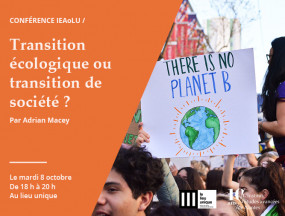News

Energy transition or societal transition? Conference by Adrian Macey at the lieu unique
Tuesday 8th October
6 pm
At the lieu unique, Nantes
IEAoLU conferences series
Free admission subject to availability
Can the response to climate change be reduced to merely a question of energy and environmental transition, or do we need to make more far-reaching changes in our lifestyles, consumer habits, etc.? The Paris Agreement promises a new regime of global climate governance, with yardsticks such as limiting global warming to 2 /1.5 degrees and becoming carbon neutral before the end of the century, as well as the key principle of “just transition”. We may wonder however whether more fundamental transformations might not be necessary to ensure a lasting solution to the challenge of climate change.
Adrian Macey is Adjunct Professor, New Zealand Climate Change Research Centre Victoria University of Wellington and fellow at the Institute of Advanced Studies Nantes.
After studies in science and literature, including a doctorate on Denis Diderot, Adrian Macey took up a career in the Ministry of Foreign Affairs. A former student at the ENA (promotion Pierre Mendes-France), he served as ambassador in Bangkok and Paris and director of international trade negotiations. In 2006, he was named Ambassador for climate change. He left the Ministry in 2010 to serve as vice-chair then chair of the Kyoto Protocol negotiations. He has served as member and chair on several GATT and WTO dispute settlement panels. His research interests include climate change policy, the connections between science and policy, international governance and trade.
IEAoLU’s Tuesdays are a series of conferences co-organised with the lieu unique, each second tuesday of the month (at 6 pm) and open to the public (free admission). Each conference is organised as follows: a fellow from the IAS-Nantes deals with a major issue in today’s society with a strong international dimension; after the conference, the discussion is opened up to the public.
All the conferences are filmed and can be viewed on our website, here, and on our YouTube channel.

